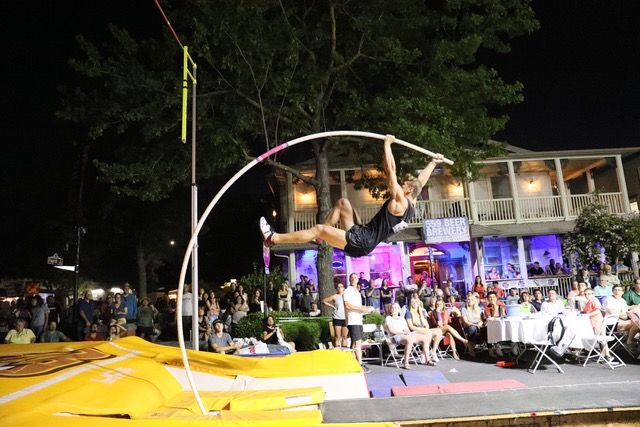
You’ve probably heard 100 times that if you’re going to reach your potential, you need to set goals. This is very true, but how to establish the right ones and follow through to achieve them is often little more than a mystery. In the previous part of this Q+A with champion pole vaulters Alexandra (Alex) Pevtsova and Garrett Starkey, the high flying couple shared the secrets of their visualization routines. Now they’re back to talk about goal setting and how they ensure each day is another step (or, in their case, leap) toward them.
With this being an Olympic year, what are your goals for the rest of 2020?
Alex: Both of us obviously have the goal to make it to trials and beyond. Personally, I've had quite a few setbacks in the past year and a half, with having moved around a lot and gone through a couple different coaches. I’ve been trying to find a place where I feel at home and comfortable and where I can really grow in my pole vaulting and everything in life.
As far as goal setting goes, as long as I'm healthy mentally, taking jumps, competing, and improving in practice, the results will come. Ultimately, we all want a PR, but I've taken a little backward step in my thinking on that. I’m still trying to hit these numbers – I want to pole vault this high indoors and I want to pole vault this high outdoors. But while I still have those in the back of my mind, I'm doing the little things that I need to do to make that happen, without focusing so much on the end result.
Garrett: The process.
Alex: Yeah, exactly. I'm working on the process goals rather than the outcome goals. You, Garrett?
Garrett: For me, the biggest thing is trying not to cap myself or limit myself with what I want to accomplish. Of course, I've got numbers out there. I'd love to jump 19 feet [5.79 meters] this year and make the Olympic team, but I don't want to cap myself. I want to focus on the process that I need to repeat daily to take me to the highest number I’m capable of hitting, and see where it takes me.
How does this approach to goal setting relate to how you process what happens at a competitive meet?
Alex: I keep a journal and I suggest that any young athlete does the same, especially for pole vault because it's so numbers related. In this journal, I write the date, what run, poll, and grip I was using that day, if I was working on any certain cues, and if they worked for me or not. Then, I usually write my gold, silver, and bronze goals for the meet right there as well. And then after I'm done, that's usually the place where I also write if I was feeling a certain way. I also write a rundown of the meet – the facts, what happened. I try not to dwell on it too much because I’ve found that I need a little bit of time to think about what just happened and how to process it.
Garrett: For me, pole vault can go a lot of different directions in a meet. There are so many variables that have to line up for you to be your best. You're not always going to hit a PR every single meet. That being said, I try and be positive after each meet. I'll analyze what things went really well, and what things could change next time so that the variables line up better.
I always try and carry the things that I did well in one meet into the next one to maintain my confidence and my sanity while I’m going through a full season. Let’s say you knocked off the last bar but you had a really good run-up and takeoff – the pole was just too small. Well, that's a really good problem to have. After the meet, you can think about that and reflect on the fact that you hit your best takeoff. So maybe next time on your third attempt, you're going to be amped up, and get a really good run-up and takeoff. To go higher, you should probably go to a bigger pole. Try to focus on positive things and take note of the things that you could change for next time.
Do you feel it’s important to celebrate small successes?
Garrett: Yes, especially when you're in a sport for the long haul. You have to celebrate the little victories that you have each time. I have PRs for everything. I don't just have my all-time PR, but also my headwind PR, my PR in the rain, and my PR at a certain distance. You can create goals for different conditions, situations, and scenarios. That way it keeps things in perspective, as not all meets are going to be equal. If you keep track of things this way, you’re always PRing and moving forward throughout the season.
Need help with setting and sticking with your goals? Do what Alex and Garrett have done, and download the Champion’s Mind app for your Android or Apple phone now.
Check back soon for part 3 of our conversation with Alex and Garrett. Missed part 1? Read it here.
